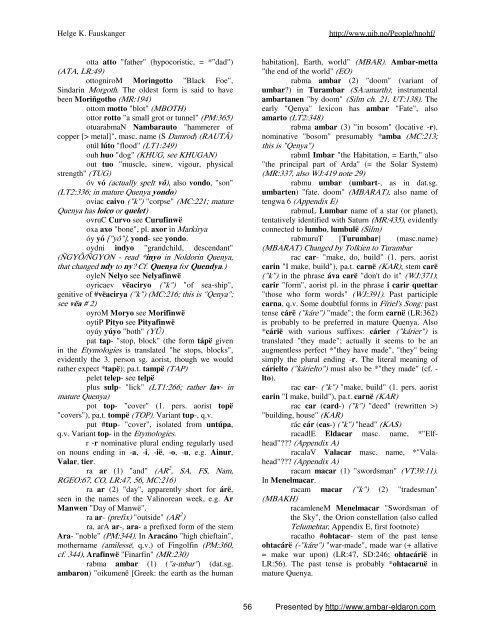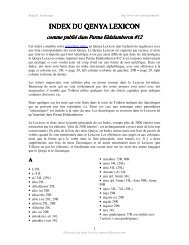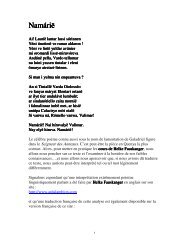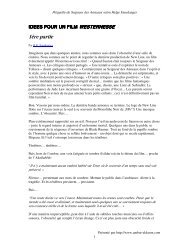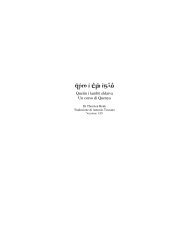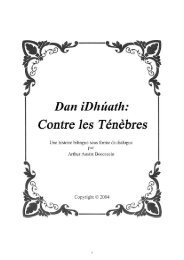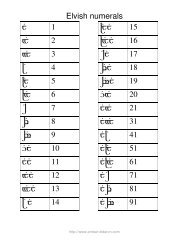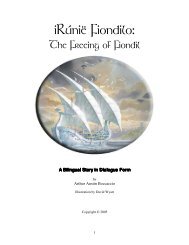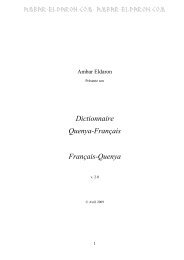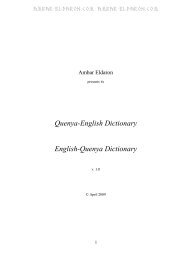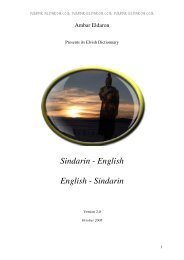Quenya Reverse Wordlist - Ambar Eldaron
Quenya Reverse Wordlist - Ambar Eldaron
Quenya Reverse Wordlist - Ambar Eldaron
Create successful ePaper yourself
Turn your PDF publications into a flip-book with our unique Google optimized e-Paper software.
Helge K. Fauskanger http://www.uib.no/People/hnohf/<br />
otta atto "father" (hypocoristic, = *"dad")<br />
(ATA, LR:49)<br />
ottogniroM Moringotto "Black Foe",<br />
Sindarin Morgoth. The oldest form is said to have<br />
been Moriñgotho (MR:194)<br />
ottom motto "blot" (MBOTH)<br />
ottor rotto "a small grot or tunnel" (PM:365)<br />
otuarabmaN Nambarauto "hammerer of<br />
copper [> metal]", masc. name (S Damrod) (RAUTÂ)<br />
otúl lúto "flood" (LT1:249)<br />
ouh huo "dog" (KHUG, see KHUGAN)<br />
out tuo "muscle, sinew, vigour, physical<br />
strength" (TUG)<br />
óv vó (actually spelt vô), also vondo, "son"<br />
(LT2:336; in mature <strong>Quenya</strong> yondo)<br />
oviac caivo ("k") "corpse" (MC:221; mature<br />
<strong>Quenya</strong> has loico or quelet)<br />
ovruC Curvo see Curufinwë<br />
oxa axo "bone", pl. axor in Markirya<br />
óy yó ["yô"], yond- see yondo.<br />
oydni indyo "grandchild, descendant"<br />
(ÑGYÔ/ÑGYON - read *inyo in Noldorin <strong>Quenya</strong>,<br />
that changed ndy to ny? Cf. <strong>Quenya</strong> for Quendya.)<br />
oyleN Nelyo see Nelyafinwë<br />
oyricaev vëaciryo ("k") "of sea-ship",<br />
genitive of #vëacirya ("k") (MC:216; this is "Qenya";<br />
see vëa # 2)<br />
oyroM Moryo see Morifinwë<br />
oytiP Pityo see Pityafinwë<br />
oyúy yúyo "both" (YÛ)<br />
pat tap- "stop, block" (the form tápë given<br />
in the Etymologies is translated "he stops, blocks",<br />
evidently the 3. person sg. aorist, though we would<br />
rather expect *tapë); pa.t. tampë (TAP)<br />
pelet telep- see telpë<br />
plus sulp- "lick" (LT1:266; rather lav- in<br />
mature <strong>Quenya</strong>)<br />
pot top- "cover" (1. pers. aorist topë<br />
"covers"), pa.t. tompë (TOP). Variant tup-, q.v.<br />
put #tup- "cover", isolated from untúpa,<br />
q.v. Variant top- in the Etymologies.<br />
r -r nominative plural ending regularly used<br />
on nouns ending in -a, -i, -ië, -o, -u, e.g. Ainur,<br />
Valar, tier.<br />
ra ar (1) "and" (AR 2 , SA, FS, Nam,<br />
RGEO:67, CO, LR:47, 56, MC:216)<br />
ra ar (2) "day", apparently short for árë,<br />
seen in the names of the Valinorean week, e.g. Ar<br />
Manwen "Day of Manwë".<br />
ra ar- (prefix) "outside" (AR 2 )<br />
ra, arA ar-, ara- a prefixed form of the stem<br />
Ara- "noble" (PM:344). In Aracáno "high chieftain",<br />
mothername (amilessë, q.v.) of Fingolfin (PM:360,<br />
cf. 344), Arafinwë "Finarfin" (MR:230)<br />
rabma ambar (1) ("a-mbar") (dat.sg.<br />
ambaron) "oikumenê [Greek: the earth as the human<br />
56<br />
habitation], Earth, world" (MBAR). <strong>Ambar</strong>-metta<br />
"the end of the world" (EO)<br />
rabma ambar (2) "doom" (variant of<br />
umbar?) in Turambar (SA:amarth); instrumental<br />
ambartanen "by doom" (Silm ch. 21, UT:138). The<br />
early "Qenya" lexicon has ambar "Fate", also<br />
amarto (LT2:348)<br />
rabma ambar (3) "in bosom" (locative -r),<br />
nominative "bosom" presumably *amba (MC:213;<br />
this is "Qenya")<br />
rabmI Imbar "the Habitation, = Earth," also<br />
"the principal part of Arda" (= the Solar System)<br />
(MR:337, also WJ:419 note 29)<br />
rabmu umbar (umbart-, as in dat.sg.<br />
umbarten) "fate. doom" (MBARAT), also name of<br />
tengwa 6 (Appendix E)<br />
rabmuL Lumbar name of a star (or planet),<br />
tentatively identified with Saturn (MR:435), evidently<br />
connected to lumbo, lumbulë (Silm)<br />
rabmuruT [Turumbar] (masc.name)<br />
(MBARAT) Changed by Tolkien to Turambar<br />
rac car- "make, do, build" (1. pers. aorist<br />
carin "I make, build"), pa.t. carnë (KAR); stem carë<br />
("k") in the phrase áva carë "don't do it" (WJ:371);<br />
carir "form", aorist pl. in the phrase i carir quettar<br />
"those who form words" (WJ:391). Past participle<br />
carna, q.v. Some doubtful forms in Fíriel's Song: past<br />
tense cárë ("káre") "made"; the form carnë (LR:362)<br />
is probably to be preferred in mature <strong>Quenya</strong>. Also<br />
*cárië with various suffixes: cárier ("kárier") is<br />
translated "they made"; actually it seems to be an<br />
augmentless perfect *"they have made", "they" being<br />
simply the plural ending -r. The literal meaning of<br />
cárielto ("kárielto") must also be *"they made" (cf. -<br />
lto).<br />
rac car- ("k") "make, build" (1. pers. aorist<br />
carin "I make, build"), pa.t. carnë (KAR)<br />
rac car (card-) ("k") "deed" (rewritten >)<br />
"building, house" (KAR)<br />
rác cár (cas-) ("k") "head" (KAS)<br />
racadlE Eldacar masc. name, *"Elfhead"???<br />
(Appendix A)<br />
racalaV Valacar masc. name, *"Valahead"???<br />
(Appendix A)<br />
racam macar (1) "swordsman" (VT39:11).<br />
In Menelmacar.<br />
racam macar ("k") (2) "tradesman"<br />
(MBAKH)<br />
racamleneM Menelmacar "Swordsman of<br />
the Sky", the Orion constellation (also called<br />
Telumehtar, Appendix E, first footnote)<br />
racatho #ohtacar- stem of the past tense<br />
ohtacárë (-"káre") "war-made", made war (+ allative<br />
= make war upon) (LR:47, SD:246; ohtacárië in<br />
LR:56). The past tense is probably *ohtacarnë in<br />
mature <strong>Quenya</strong>.<br />
Presented by http://www.ambar-eldaron.com


